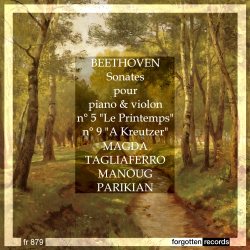| 
|
Ludwig van BEETHOVEN (1770-1827)
Sonata No. 5 in F Major, Op. 24, ‘Spring’ (1801) [23:12]
Sonata No. 9 in A Major, Op. 47 ‘Kreutzer’ (1803) [33:55]
Manoug Parikian (violin)
Magda Tagliaferro (piano)
rec. October 1960, Geneva
FORGOTTEN RECORDS FR879 [57:08]
This is one of those unlikely-seeming pairings on disc. I’m not sure how Magda Tagliaferro was teamed with Manoug Parikian for this recording of the two ‘named’ Beethoven violin sonatas. Possibly Parikian, who a few years earlier had given up the position, had met the pianist through his travels as leader of the Philharmonia Orchestra, or maybe he had met her at recording sessions. It would be interesting to know how this one-off studio encounter came to be, as the result was published by the Guilde Internationale du Disque, and also on Concert Hall and Prestige de la Musique LP. I’m not aware of any previous CD restoration.
Tagliaferro was the senior partner, a much-admired soloist, and an experienced recording artist by now. Parikian, though, had begun to pick up some important solo engagements and had, the previous year, played the Mendelssohn E minor at the Proms in London. The following year he was to further cement his reputation with Shostakovich 1. When I heard him, toward the end of his career, it was in the Delius Concerto, which he played beautifully. It was a work he’d played at the Proms in 1969.
This standard coupling reveals a buoyant partnership. No shrinking violets, Tagliaferro and Parikian bring punchy musicianship to bear on the Spring, where the pianist’s chording is strongly realised and where the violinist alternates sweet and tautly expressive tones. The slow movement is pliant with counter or subsidiary themes properly balanced, and the finale well-characterised. Others have been niftier, but this is engaging, properly chamber-sized playing. I recall listening to Parkian reflect on interpretations of the Kreutzer sonata in which he gently admonished older players for their pervasive use of portamento. Parikian’s purposeful opening flourish is not distended in the way some contemporary ones can be and whilst he can be overpowered by Tagliaferro at a few points, this is in compensation a lively and alert reading. One feels even here that she is the leading partner, Parikian somewhat deferring to her. The variations are deftly played – notably fine bowing throughout – though the pizzicato episode could have been more prominently recorded. The minor recording problems are inherent in the master tapes I understand - a little splintering from time to time and some saturation in the fortissimo passages. Not too much need be made of this, as the performance overrides most of these small deficiencies.
Jonathan Woolf
 |
 |
|











